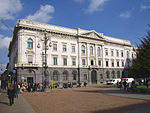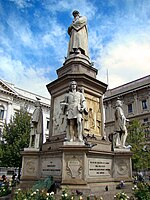Milan (, US also , Milanese: [miˈlãː] (listen); Italian: Milano [miˈlaːno] (listen)) is a city in northern Italy, capital of Lombardy, and the second-most populous city proper in Italy after Rome. The city proper has a population of about 1.4 million, while its metropolitan city has 3.26 million inhabitants. Its continuously built-up urban area, that stretches well beyond the boundaries of the administrative metropolitan city and into Switzerland, is the fourth largest in the EU with 5.27 million inhabitants. According to national sources, the population within the wider Milan metropolitan area (also known as Greater Milan), is estimated between 8.2 million and 12.5 million making it by far the largest metropolitan area in Italy and one of the largest in the EU.Milan is considered a leading alpha global city, with strengths in the fields of art, commerce, design, education, entertainment, fashion, finance, healthcare, media, services, research and tourism. Its business district hosts Italy's stock exchange (Italian: Borsa Italiana), and the headquarters of national and international banks and companies. In terms of GDP, Milan is the wealthiest city in Italy, has the third-largest economy among EU cities after Paris and Madrid, and is the wealthiest among EU non-capital cities. Milan is viewed along with Turin as the southernmost part of the Blue Banana urban development corridor (also known as the "European Megalopolis"), and one of the Four Motors for Europe.
The city's role as a major political centre dates back to the late antiquity, when it served as the capital of the Western Roman Empire, while from the 12th century until the 16th century, Milan was one of the largest European cities, and a major trade and commercial centre, consequently becoming the capital of the Duchy of Milan, which was one of the greatest political, artistic and fashion forces in the Renaissance. Despite losing much of its political and cultural importance in the early modern period, the city regained its status as a major economic and political centre, being considered today as the industrial and financial capital of Italy.The city has been recognized as one of the world's four fashion capitals (the others being London, New York, and Paris) thanks to several international events and fairs, including Milan Fashion Week and the Milan Furniture Fair, which are among the world's biggest in terms of revenue, visitors and growth. It hosted the Universal Exposition in 1906 and 2015. The city hosts numerous cultural institutions, academies and universities, with 11% of the national total of enrolled students. Milan received 10 million visitors in 2018, with the largest numbers of foreign visitors coming from China, United States, France and Germany. The tourists are attracted by Milan's museums and art galleries that include some of the most important collections in the world, including major works by Leonardo da Vinci. The city is served by many luxury hotels and is the fifth-most starred in the world by Michelin Guide. Milan is also home to two of Europe's most successful football teams, A.C. Milan and Inter Milan, and one of Europe's main basketball teams, Olimpia Milano. Milan will host the Olympic and Paralympic games for the first time in 2026, together with Cortina d'Ampezzo.










